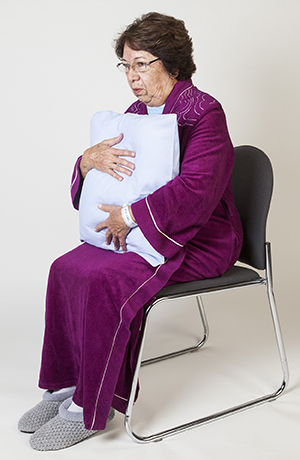A
B
C
D
E
F
G
H
I
J
K
L
M
N
O
P
Q
R
S
T
U
V
W
X
Y
Z
Topic IndexLibrary Index
Click a letter to see a list of conditions beginning with that letter.
Click 'Topic Index' to return to the index for the current topic.
Click 'Library Index' to return to the listing of all topics.
Deep Breathing
Deep breathing helps keep your lungs clear. If you’ve had surgery, this will help you get better faster. Deep breathing also helps you breathe easier and may prevent a lung infection or other complications.
Home care

Follow these steps to do deep breathing:
-
Sit on the edge of a bed or a chair. You can also lie on your back with your knees slightly bent.
-
If you've had surgery on or near your chest or belly, hold a pillow or rolled-up towel firmly against your cut (incision) with both hands. Hug the pillow.
-
Breathe out normally.
-
Breathe in deeply through your nose. Feel your stomach push out as you breathe in.
-
Hold your breath for 2 to 5 seconds, if possible.
-
Pucker your lips as you would to blow out a candle.
-
With your lips puckered, breathe out slowly through your mouth. You should feel your chest go down as you breathe out.
-
Rest for a few seconds, breathing normally.
-
Relax your neck and shoulder muscles.
-
Repeat the above steps as many times as directed.
Follow-up
Make a follow-up appointment, or as directed by your healthcare provider.
When to get medical care
Call your healthcare provider right away if any of these occur:
-
Fever of 100.4°F (38°C) or higher, or as advised by your provider
-
Signs of infection, if you've had surgery. These include redness, swelling, or warmth at your incision site, or pus or fluid draining from the site.
-
Brownish or bloody sputum (mucus)
-
Minor bleeding from surgical site
-
New cough
-
Upset stomach (nausea) or vomiting
-
Increasing pain
-
Dizziness or weakness
-
Fast or irregular heartbeat
Call 911
Shortness of breath may be a sign of a serious health problem. Call 911right away if you have shortness of breath that gets worse or have trouble breathing, especially with any of the symptoms below:
-
Confusion or trouble staying awake
-
Loss of consciousness or fainting
-
Chest pain or tightness
-
Trouble breathing or wheezing
-
Bluish skin or lips
-
Coughing up blood
-
Severe pain
-
Severe bleeding or new opening at surgical site
Online Medical Reviewer:
Deborah Pedersen MD
Online Medical Reviewer:
Jessica Gotwals BSN MPH
Online Medical Reviewer:
Marianne Fraser MSN RN
Date Last Reviewed:
6/1/2022
© 2000-2024 The StayWell Company, LLC. All rights reserved. This information is not intended as a substitute for professional medical care. Always follow your healthcare professional's instructions.